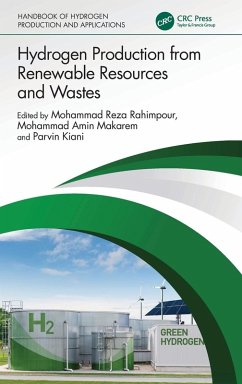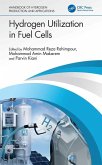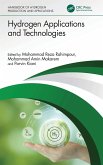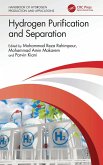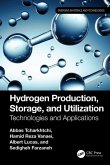Hydrogen Production from Renewable Resources and Wastes
Herausgeber: Rahimpour, Mohammad Reza; Kiani, Parvin; Makarem, Mohammad Amin
Hydrogen Production from Renewable Resources and Wastes
Herausgeber: Rahimpour, Mohammad Reza; Kiani, Parvin; Makarem, Mohammad Amin
- Gebundenes Buch
- Merkliste
- Auf die Merkliste
- Bewerten Bewerten
- Teilen
- Produkt teilen
- Produkterinnerung
- Produkterinnerung
This book provides readers with a comprehensive overview of the processes and technologies utilized for producing hydrogen from renewable sources. It discusses common and novel methods and covers in detail the application of various renewable sources, including wind, solar, and geothermal energy.
Andere Kunden interessierten sich auch für
![Hydrogen Production from Nonrenewable Resources Hydrogen Production from Nonrenewable Resources]() Hydrogen Production from Nonrenewable Resources173,99 €
Hydrogen Production from Nonrenewable Resources173,99 €![Hydrogen Utilization in Fuel Cells Hydrogen Utilization in Fuel Cells]() Hydrogen Utilization in Fuel Cells173,99 €
Hydrogen Utilization in Fuel Cells173,99 €![Hydrogen Transportation and Storage Hydrogen Transportation and Storage]() Hydrogen Transportation and Storage144,99 €
Hydrogen Transportation and Storage144,99 €![Hydrogen Applications and Technologies Hydrogen Applications and Technologies]() Hydrogen Applications and Technologies172,99 €
Hydrogen Applications and Technologies172,99 €![Hydrogen Purification and Separation Hydrogen Purification and Separation]() Hydrogen Purification and Separation173,99 €
Hydrogen Purification and Separation173,99 €![Hydrogen Production, Storage, and Utilization Hydrogen Production, Storage, and Utilization]() Abbas TcharkhtchiHydrogen Production, Storage, and Utilization153,99 €
Abbas TcharkhtchiHydrogen Production, Storage, and Utilization153,99 €![Biogas Technology in Nigeria Biogas Technology in Nigeria]() Isaac Nathaniel ItodoBiogas Technology in Nigeria68,99 €
Isaac Nathaniel ItodoBiogas Technology in Nigeria68,99 €-
-
-
This book provides readers with a comprehensive overview of the processes and technologies utilized for producing hydrogen from renewable sources. It discusses common and novel methods and covers in detail the application of various renewable sources, including wind, solar, and geothermal energy.
Produktdetails
- Produktdetails
- Verlag: CRC Press
- Seitenzahl: 356
- Erscheinungstermin: 8. November 2024
- Englisch
- Abmessung: 234mm x 156mm x 22mm
- Gewicht: 694g
- ISBN-13: 9781032465609
- ISBN-10: 1032465603
- Artikelnr.: 70151419
- Herstellerkennzeichnung
- Libri GmbH
- Europaallee 1
- 36244 Bad Hersfeld
- gpsr@libri.de
- Verlag: CRC Press
- Seitenzahl: 356
- Erscheinungstermin: 8. November 2024
- Englisch
- Abmessung: 234mm x 156mm x 22mm
- Gewicht: 694g
- ISBN-13: 9781032465609
- ISBN-10: 1032465603
- Artikelnr.: 70151419
- Herstellerkennzeichnung
- Libri GmbH
- Europaallee 1
- 36244 Bad Hersfeld
- gpsr@libri.de
Mohammad Reza Rahimpour is a Distinguished Professor of Chemical Engineering at Shiraz University, Iran. He earned a PhD in chemical engineering at Shiraz University, in collaboration with the University of Sydney, Australia, in 1988. He leads a pioneering research group specializing in fuel processing technology, with a particular focus on the catalytic conversion of both fossil fuels, such as natural gas, and renewable fuels, like biöoils derived from lignin, into valuable energy sources. Throughout his academic career, Dr. Rahimpour has specialized in hydrogen production technologies, including steam methane reforming, water electrolysis, photocatalytic hydrogen production, and hydrogen production from both renewable sources and fossil fuels. His extensive expertise and innovative research significantly contribute to advancements in hydrogen production and its practical applications. Mohammad Amin Makarem earned a PhD in chemical engineering at Shiraz University. His research interests include gas separation and purification, nanofluids, microfluidics, catalyst synthesis, reactor design, and green energy. Parvin Kiani earned a degree in chemical engineering at Shiraz University. Her research has focused on gas separation, clean energy, and catalyst synthesis.
Section I: Water Splitting Conversion Processes. 1. Hydrogen Production
through Electrolysis. 2. Hydrogen Production from Water Thermochemical
Splitting. Section II: Biomass and Wastes Thermochemical Conversion
Processes. 3. Pyrolysis Process for Conversion of Lignin to Hydrogen. 4.
Pyrolysis Process for Conversion of Sewage Sludge to Hydrogen. 5. Pyrolysis
of Municipal Biomass Wastes for Hydrogen Production. 6. Gasification of
Lignin for Hydrogen Production. 7. Gasification of Sewage Sludge for
Hydrogen Production. 8. Liquefaction of Algal Material for Hydrogen
Production. Section III: Biomass Biochemical Conversion Processes. 9.
Biophotolysis Process for Biomass Conversion to Hydrogen. 10. Biological
Water¿Gas Shift Reaction Process for Hydrogen Production. 11. The
Fermentation Process for Biomass Conversion to Hydrogen. Section IV: Other
Renewable Resources for Hydrogen Production. 12. Application of Solar
Energy in Hydrogen Production. 13. Application of Hydropower Energy in
Hydrogen Production: Tide, Wave, Water Flow, and Fall. 14. Application of
Geothermal Energy in Hydrogen Production.
through Electrolysis. 2. Hydrogen Production from Water Thermochemical
Splitting. Section II: Biomass and Wastes Thermochemical Conversion
Processes. 3. Pyrolysis Process for Conversion of Lignin to Hydrogen. 4.
Pyrolysis Process for Conversion of Sewage Sludge to Hydrogen. 5. Pyrolysis
of Municipal Biomass Wastes for Hydrogen Production. 6. Gasification of
Lignin for Hydrogen Production. 7. Gasification of Sewage Sludge for
Hydrogen Production. 8. Liquefaction of Algal Material for Hydrogen
Production. Section III: Biomass Biochemical Conversion Processes. 9.
Biophotolysis Process for Biomass Conversion to Hydrogen. 10. Biological
Water¿Gas Shift Reaction Process for Hydrogen Production. 11. The
Fermentation Process for Biomass Conversion to Hydrogen. Section IV: Other
Renewable Resources for Hydrogen Production. 12. Application of Solar
Energy in Hydrogen Production. 13. Application of Hydropower Energy in
Hydrogen Production: Tide, Wave, Water Flow, and Fall. 14. Application of
Geothermal Energy in Hydrogen Production.
Section I: Water Splitting Conversion Processes. 1. Hydrogen Production
through Electrolysis. 2. Hydrogen Production from Water Thermochemical
Splitting. Section II: Biomass and Wastes Thermochemical Conversion
Processes. 3. Pyrolysis Process for Conversion of Lignin to Hydrogen. 4.
Pyrolysis Process for Conversion of Sewage Sludge to Hydrogen. 5. Pyrolysis
of Municipal Biomass Wastes for Hydrogen Production. 6. Gasification of
Lignin for Hydrogen Production. 7. Gasification of Sewage Sludge for
Hydrogen Production. 8. Liquefaction of Algal Material for Hydrogen
Production. Section III: Biomass Biochemical Conversion Processes. 9.
Biophotolysis Process for Biomass Conversion to Hydrogen. 10. Biological
Water¿Gas Shift Reaction Process for Hydrogen Production. 11. The
Fermentation Process for Biomass Conversion to Hydrogen. Section IV: Other
Renewable Resources for Hydrogen Production. 12. Application of Solar
Energy in Hydrogen Production. 13. Application of Hydropower Energy in
Hydrogen Production: Tide, Wave, Water Flow, and Fall. 14. Application of
Geothermal Energy in Hydrogen Production.
through Electrolysis. 2. Hydrogen Production from Water Thermochemical
Splitting. Section II: Biomass and Wastes Thermochemical Conversion
Processes. 3. Pyrolysis Process for Conversion of Lignin to Hydrogen. 4.
Pyrolysis Process for Conversion of Sewage Sludge to Hydrogen. 5. Pyrolysis
of Municipal Biomass Wastes for Hydrogen Production. 6. Gasification of
Lignin for Hydrogen Production. 7. Gasification of Sewage Sludge for
Hydrogen Production. 8. Liquefaction of Algal Material for Hydrogen
Production. Section III: Biomass Biochemical Conversion Processes. 9.
Biophotolysis Process for Biomass Conversion to Hydrogen. 10. Biological
Water¿Gas Shift Reaction Process for Hydrogen Production. 11. The
Fermentation Process for Biomass Conversion to Hydrogen. Section IV: Other
Renewable Resources for Hydrogen Production. 12. Application of Solar
Energy in Hydrogen Production. 13. Application of Hydropower Energy in
Hydrogen Production: Tide, Wave, Water Flow, and Fall. 14. Application of
Geothermal Energy in Hydrogen Production.

